Lidl Expansion in Greece: A Comprehensive Analysis
VerifiedAdded on 2024/05/17
|17
|3472
|382
AI Summary
This report examines the potential for Lidl, a leading discount supermarket chain, to expand into the Greek market. It analyzes the country's business environment using PESTLE analysis, Porter's Five Forces, and Ansoff's Growth Matrix. The report considers the economic and political challenges Greece faces, as well as the opportunities presented by its tourism industry and consumer demand for affordable products. It concludes that while Greece presents challenges, Lidl's unique business model and strong brand recognition could position it for success in the long term.
Contribute Materials
Your contribution can guide someone’s learning journey. Share your
documents today.
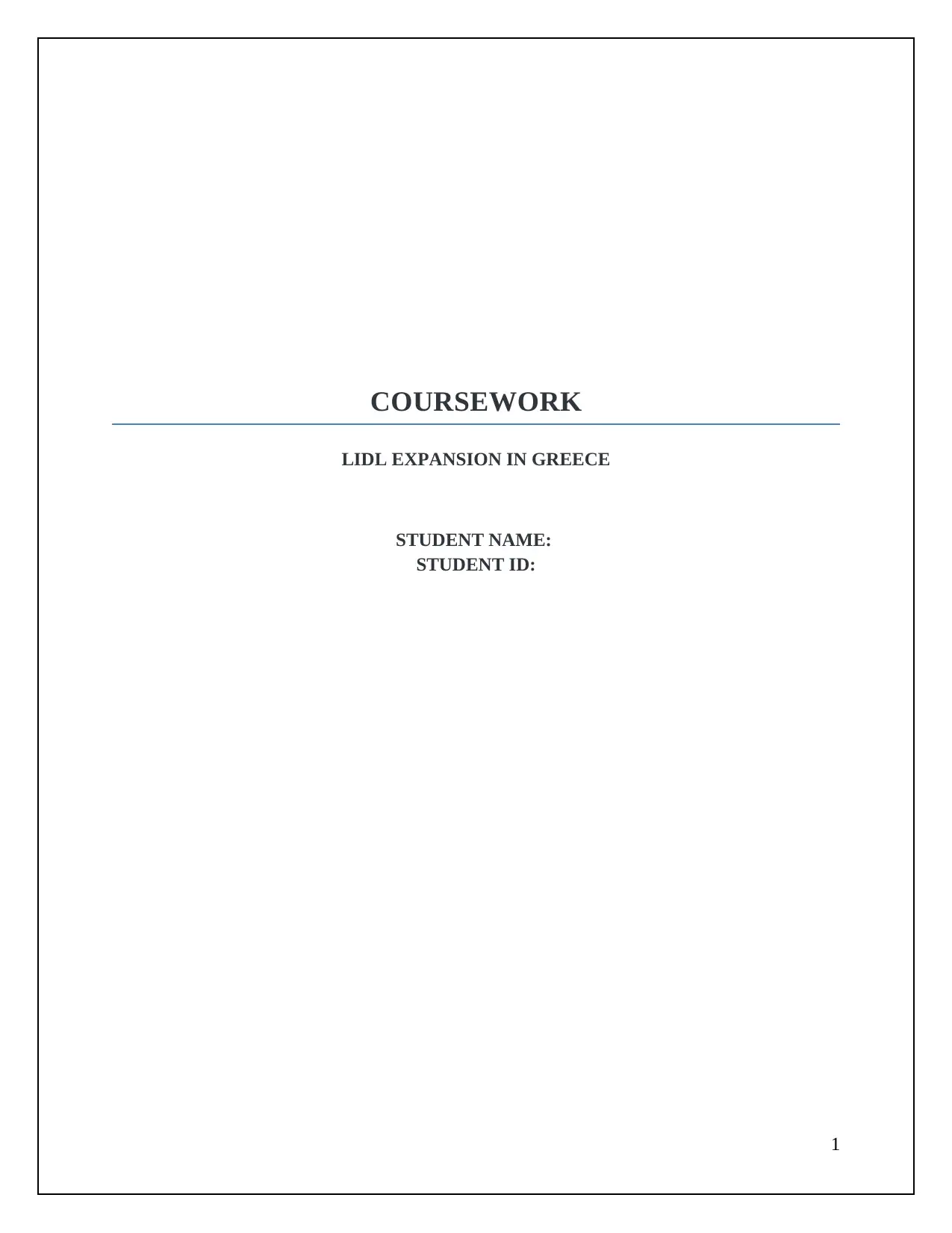
COURSEWORK
LIDL EXPANSION IN GREECE
STUDENT NAME:
STUDENT ID:
1
LIDL EXPANSION IN GREECE
STUDENT NAME:
STUDENT ID:
1
Secure Best Marks with AI Grader
Need help grading? Try our AI Grader for instant feedback on your assignments.
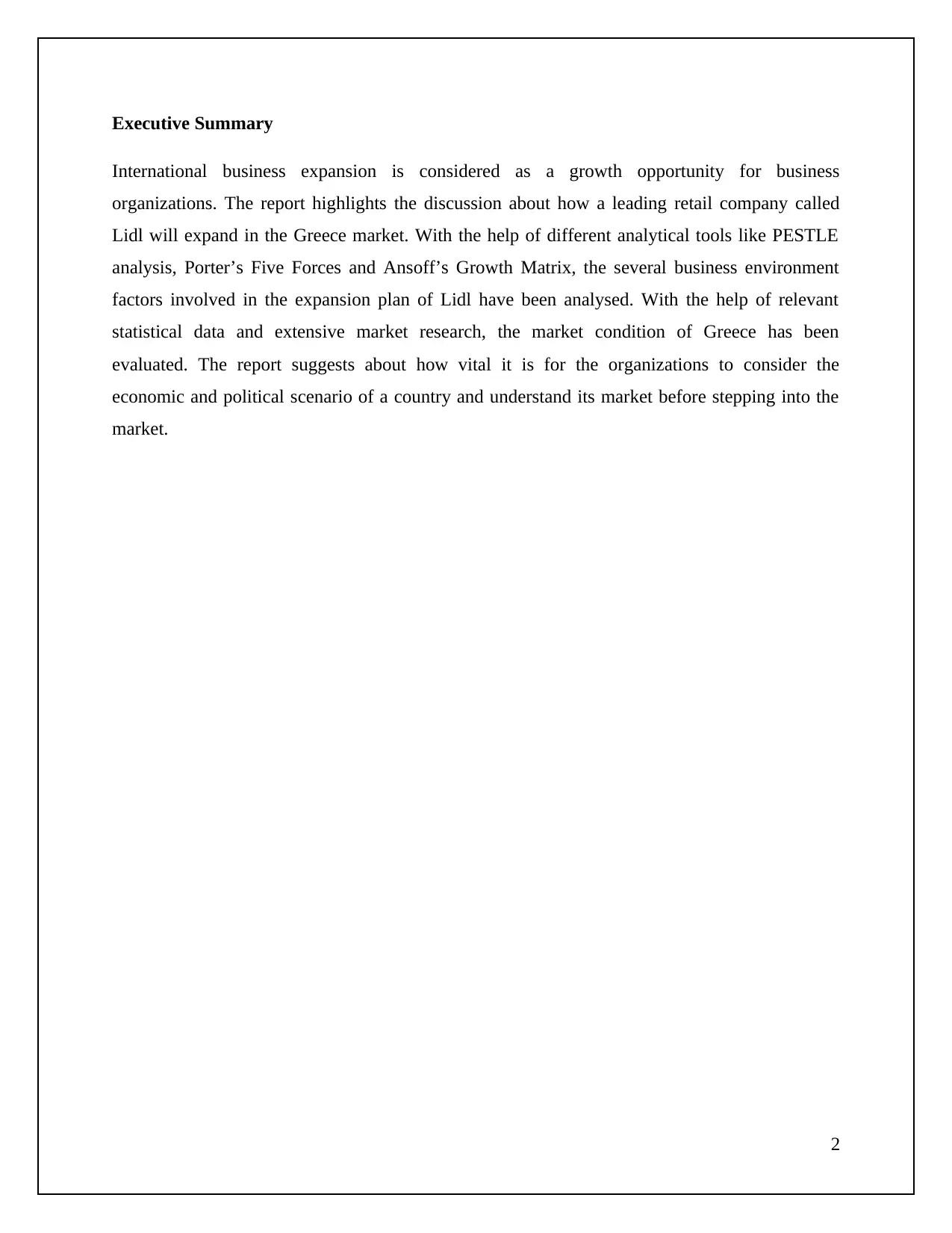
Executive Summary
International business expansion is considered as a growth opportunity for business
organizations. The report highlights the discussion about how a leading retail company called
Lidl will expand in the Greece market. With the help of different analytical tools like PESTLE
analysis, Porter’s Five Forces and Ansoff’s Growth Matrix, the several business environment
factors involved in the expansion plan of Lidl have been analysed. With the help of relevant
statistical data and extensive market research, the market condition of Greece has been
evaluated. The report suggests about how vital it is for the organizations to consider the
economic and political scenario of a country and understand its market before stepping into the
market.
2
International business expansion is considered as a growth opportunity for business
organizations. The report highlights the discussion about how a leading retail company called
Lidl will expand in the Greece market. With the help of different analytical tools like PESTLE
analysis, Porter’s Five Forces and Ansoff’s Growth Matrix, the several business environment
factors involved in the expansion plan of Lidl have been analysed. With the help of relevant
statistical data and extensive market research, the market condition of Greece has been
evaluated. The report suggests about how vital it is for the organizations to consider the
economic and political scenario of a country and understand its market before stepping into the
market.
2
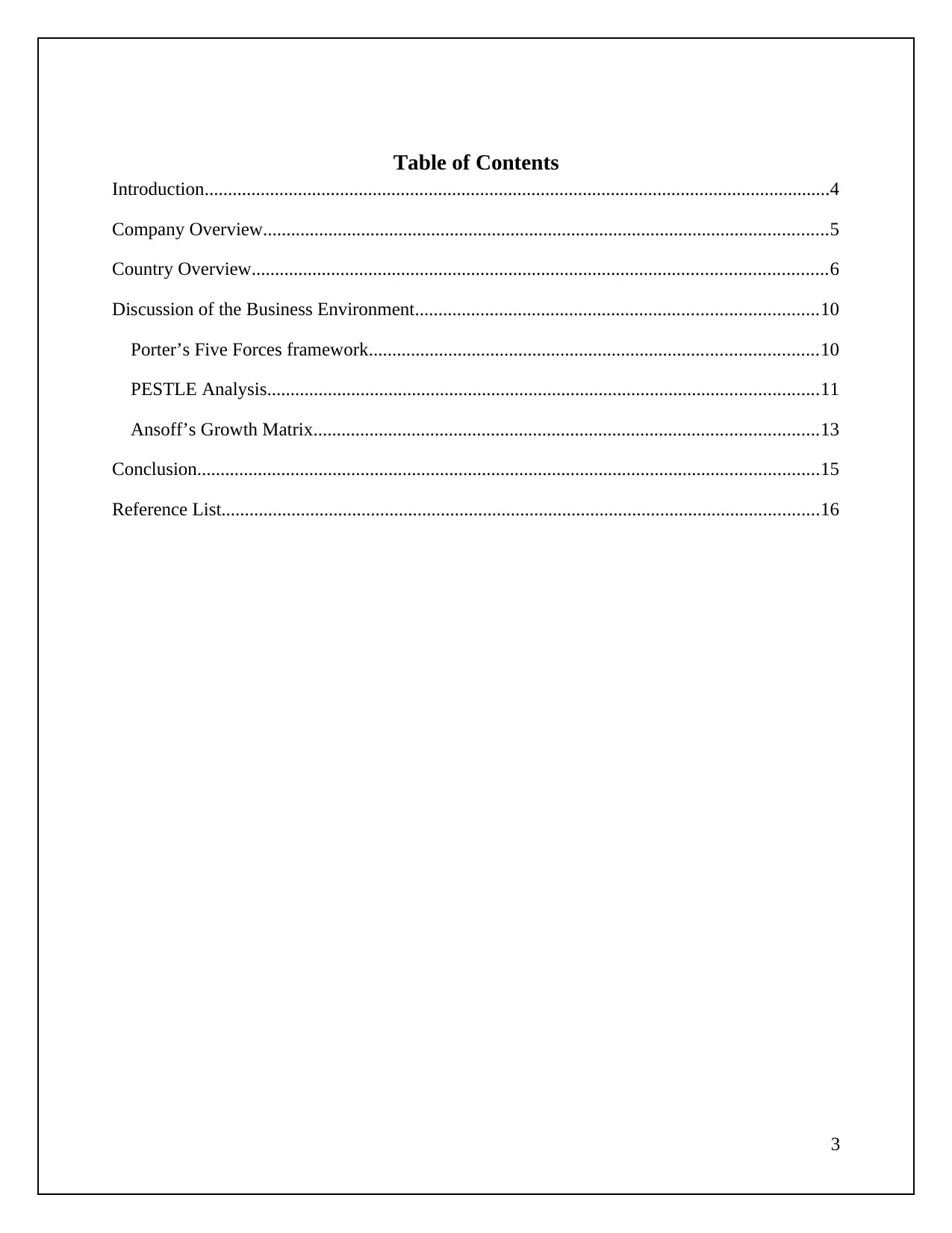
Table of Contents
Introduction......................................................................................................................................4
Company Overview.........................................................................................................................5
Country Overview...........................................................................................................................6
Discussion of the Business Environment......................................................................................10
Porter’s Five Forces framework................................................................................................10
PESTLE Analysis......................................................................................................................11
Ansoff’s Growth Matrix............................................................................................................13
Conclusion.....................................................................................................................................15
Reference List................................................................................................................................16
3
Introduction......................................................................................................................................4
Company Overview.........................................................................................................................5
Country Overview...........................................................................................................................6
Discussion of the Business Environment......................................................................................10
Porter’s Five Forces framework................................................................................................10
PESTLE Analysis......................................................................................................................11
Ansoff’s Growth Matrix............................................................................................................13
Conclusion.....................................................................................................................................15
Reference List................................................................................................................................16
3
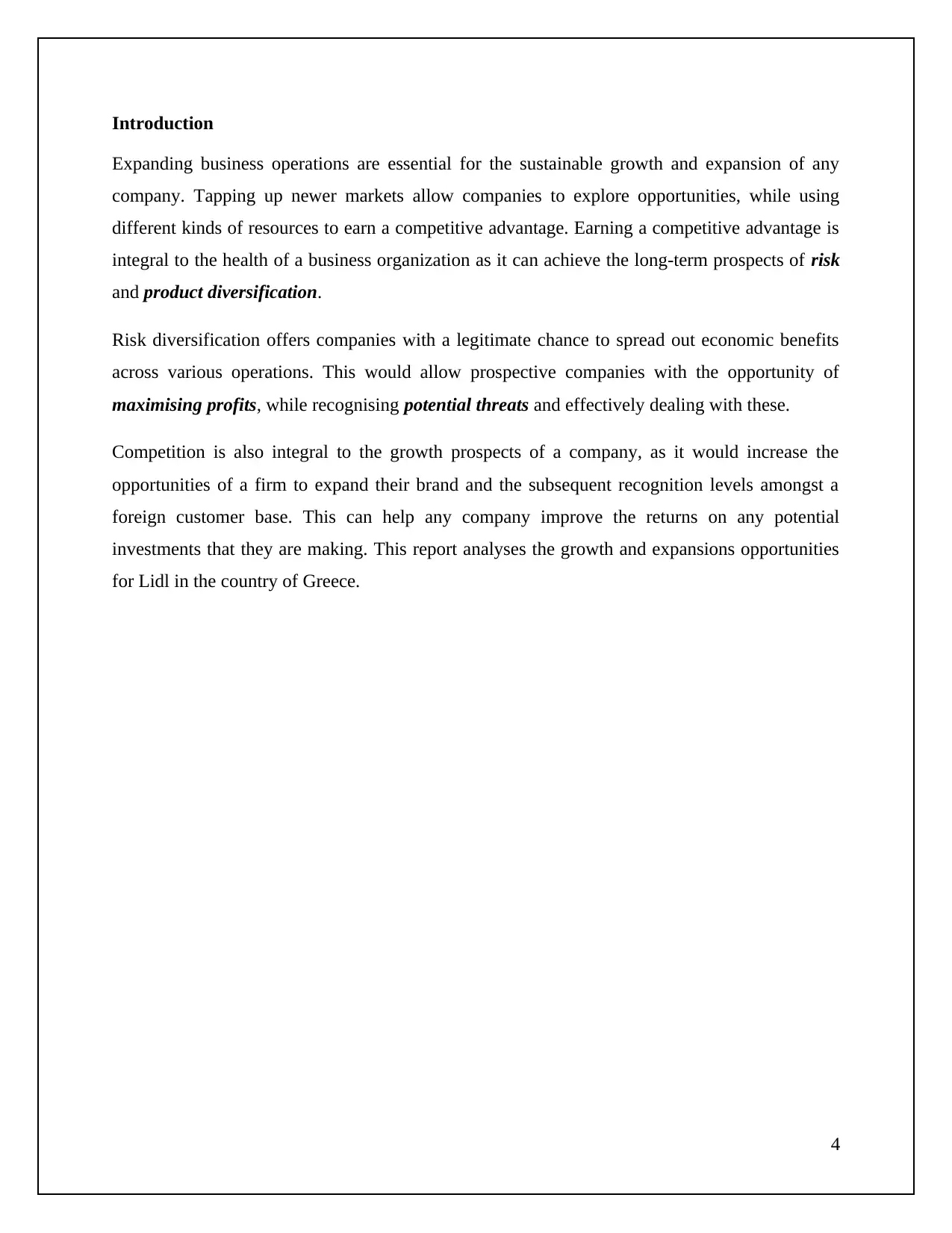
Introduction
Expanding business operations are essential for the sustainable growth and expansion of any
company. Tapping up newer markets allow companies to explore opportunities, while using
different kinds of resources to earn a competitive advantage. Earning a competitive advantage is
integral to the health of a business organization as it can achieve the long-term prospects of risk
and product diversification.
Risk diversification offers companies with a legitimate chance to spread out economic benefits
across various operations. This would allow prospective companies with the opportunity of
maximising profits, while recognising potential threats and effectively dealing with these.
Competition is also integral to the growth prospects of a company, as it would increase the
opportunities of a firm to expand their brand and the subsequent recognition levels amongst a
foreign customer base. This can help any company improve the returns on any potential
investments that they are making. This report analyses the growth and expansions opportunities
for Lidl in the country of Greece.
4
Expanding business operations are essential for the sustainable growth and expansion of any
company. Tapping up newer markets allow companies to explore opportunities, while using
different kinds of resources to earn a competitive advantage. Earning a competitive advantage is
integral to the health of a business organization as it can achieve the long-term prospects of risk
and product diversification.
Risk diversification offers companies with a legitimate chance to spread out economic benefits
across various operations. This would allow prospective companies with the opportunity of
maximising profits, while recognising potential threats and effectively dealing with these.
Competition is also integral to the growth prospects of a company, as it would increase the
opportunities of a firm to expand their brand and the subsequent recognition levels amongst a
foreign customer base. This can help any company improve the returns on any potential
investments that they are making. This report analyses the growth and expansions opportunities
for Lidl in the country of Greece.
4
Secure Best Marks with AI Grader
Need help grading? Try our AI Grader for instant feedback on your assignments.
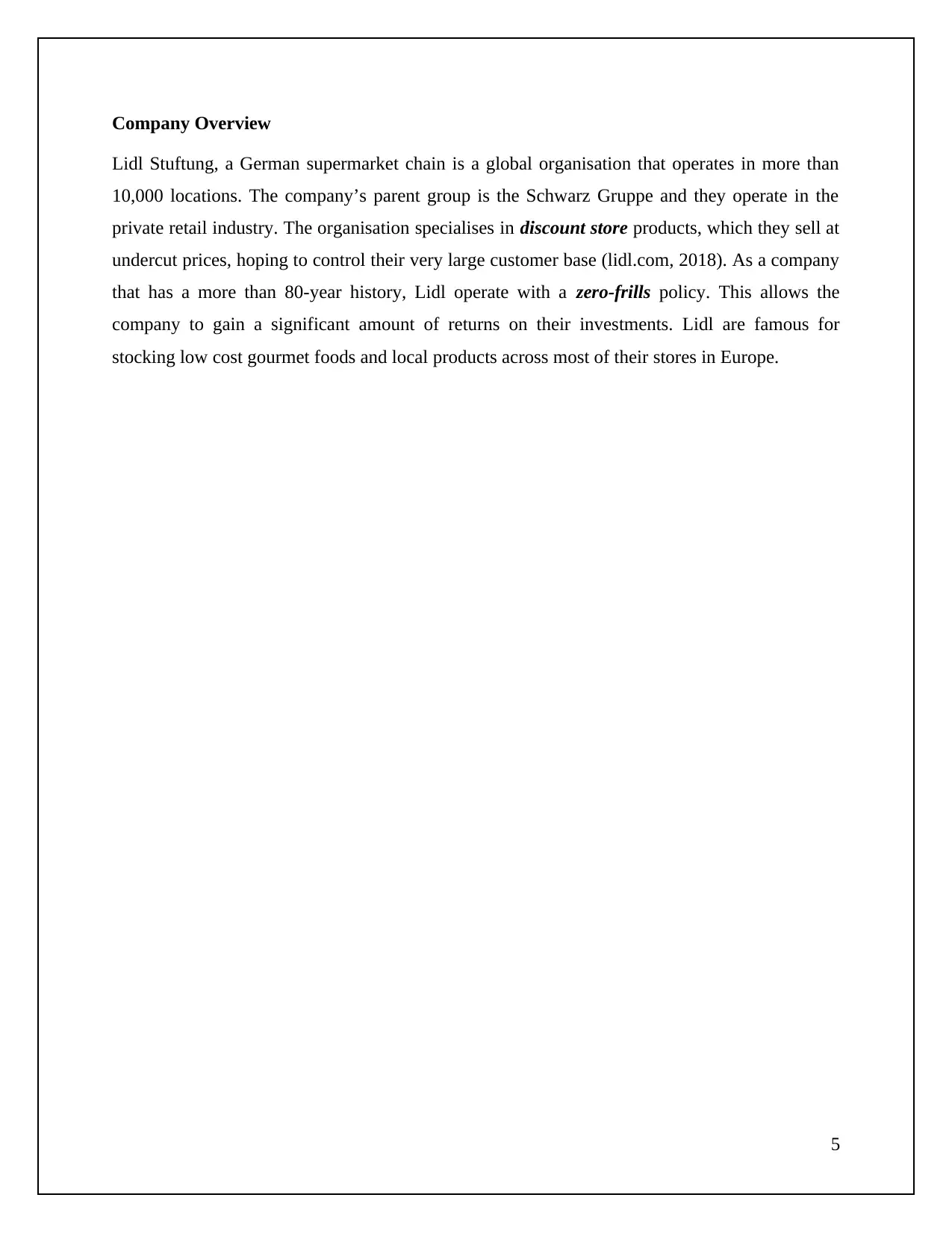
Company Overview
Lidl Stuftung, a German supermarket chain is a global organisation that operates in more than
10,000 locations. The company’s parent group is the Schwarz Gruppe and they operate in the
private retail industry. The organisation specialises in discount store products, which they sell at
undercut prices, hoping to control their very large customer base (lidl.com, 2018). As a company
that has a more than 80-year history, Lidl operate with a zero-frills policy. This allows the
company to gain a significant amount of returns on their investments. Lidl are famous for
stocking low cost gourmet foods and local products across most of their stores in Europe.
5
Lidl Stuftung, a German supermarket chain is a global organisation that operates in more than
10,000 locations. The company’s parent group is the Schwarz Gruppe and they operate in the
private retail industry. The organisation specialises in discount store products, which they sell at
undercut prices, hoping to control their very large customer base (lidl.com, 2018). As a company
that has a more than 80-year history, Lidl operate with a zero-frills policy. This allows the
company to gain a significant amount of returns on their investments. Lidl are famous for
stocking low cost gourmet foods and local products across most of their stores in Europe.
5
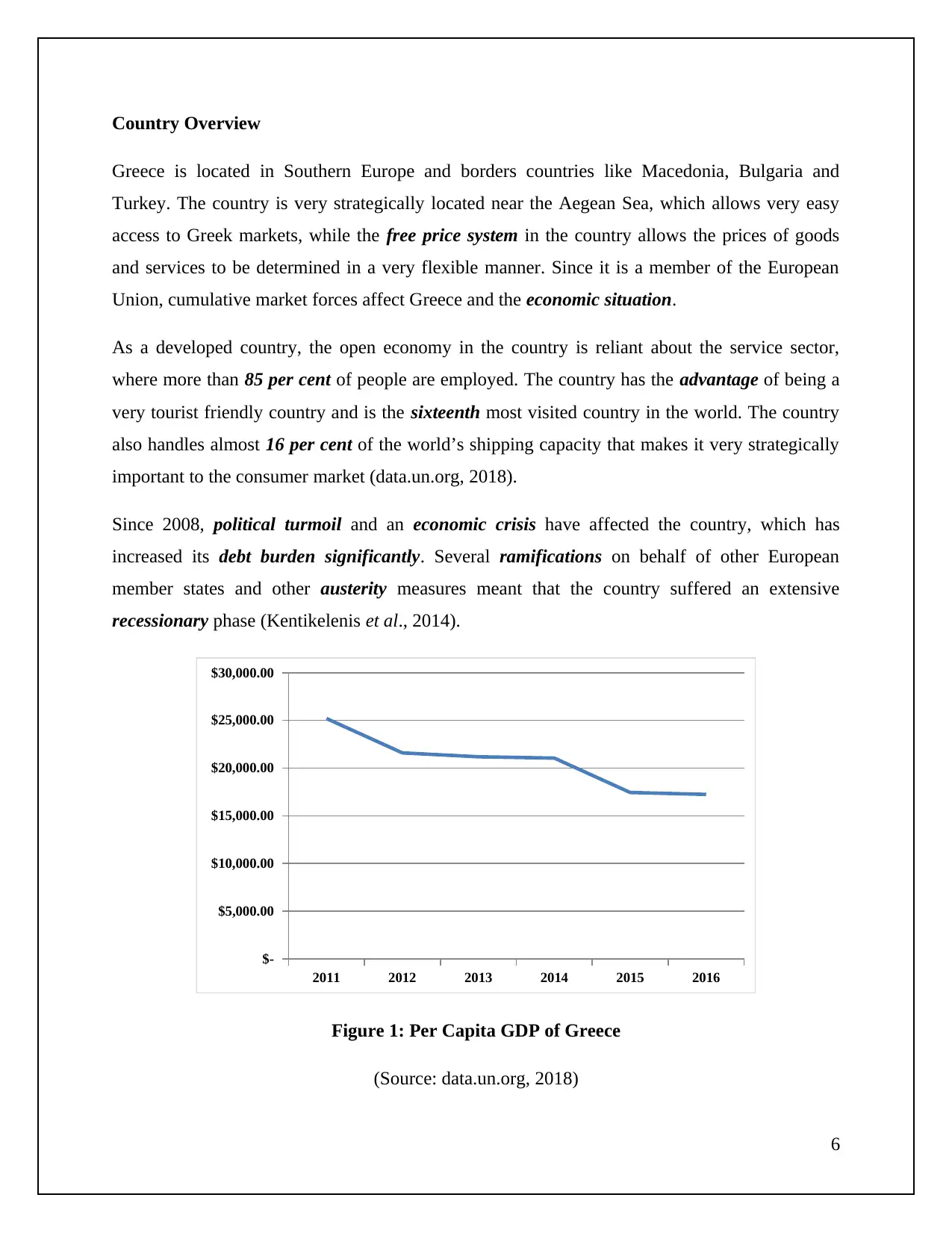
Country Overview
Greece is located in Southern Europe and borders countries like Macedonia, Bulgaria and
Turkey. The country is very strategically located near the Aegean Sea, which allows very easy
access to Greek markets, while the free price system in the country allows the prices of goods
and services to be determined in a very flexible manner. Since it is a member of the European
Union, cumulative market forces affect Greece and the economic situation.
As a developed country, the open economy in the country is reliant about the service sector,
where more than 85 per cent of people are employed. The country has the advantage of being a
very tourist friendly country and is the sixteenth most visited country in the world. The country
also handles almost 16 per cent of the world’s shipping capacity that makes it very strategically
important to the consumer market (data.un.org, 2018).
Since 2008, political turmoil and an economic crisis have affected the country, which has
increased its debt burden significantly. Several ramifications on behalf of other European
member states and other austerity measures meant that the country suffered an extensive
recessionary phase (Kentikelenis et al., 2014).
2011 2012 2013 2014 2015 2016
$-
$5,000.00
$10,000.00
$15,000.00
$20,000.00
$25,000.00
$30,000.00
Figure 1: Per Capita GDP of Greece
(Source: data.un.org, 2018)
6
Greece is located in Southern Europe and borders countries like Macedonia, Bulgaria and
Turkey. The country is very strategically located near the Aegean Sea, which allows very easy
access to Greek markets, while the free price system in the country allows the prices of goods
and services to be determined in a very flexible manner. Since it is a member of the European
Union, cumulative market forces affect Greece and the economic situation.
As a developed country, the open economy in the country is reliant about the service sector,
where more than 85 per cent of people are employed. The country has the advantage of being a
very tourist friendly country and is the sixteenth most visited country in the world. The country
also handles almost 16 per cent of the world’s shipping capacity that makes it very strategically
important to the consumer market (data.un.org, 2018).
Since 2008, political turmoil and an economic crisis have affected the country, which has
increased its debt burden significantly. Several ramifications on behalf of other European
member states and other austerity measures meant that the country suffered an extensive
recessionary phase (Kentikelenis et al., 2014).
2011 2012 2013 2014 2015 2016
$-
$5,000.00
$10,000.00
$15,000.00
$20,000.00
$25,000.00
$30,000.00
Figure 1: Per Capita GDP of Greece
(Source: data.un.org, 2018)
6
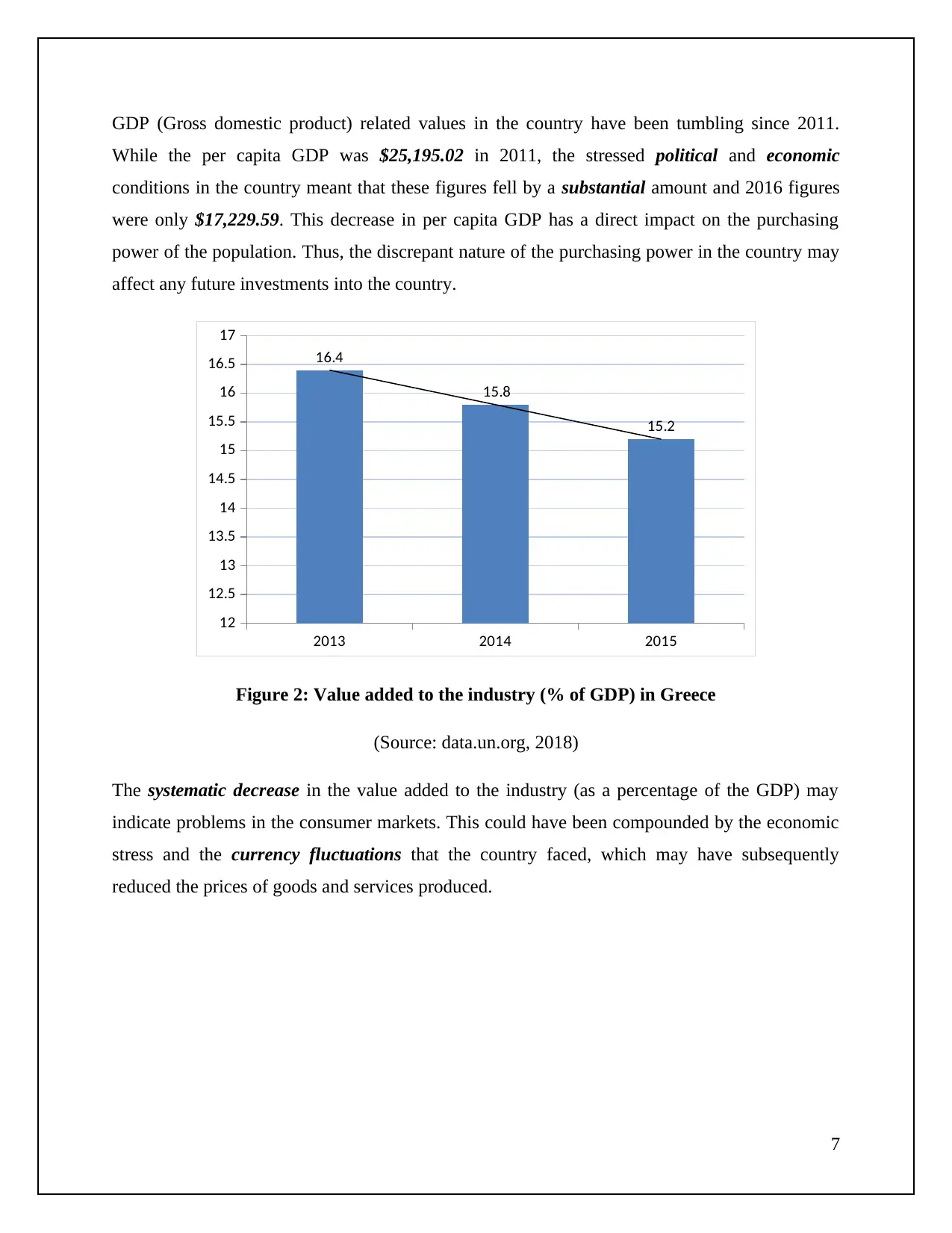
GDP (Gross domestic product) related values in the country have been tumbling since 2011.
While the per capita GDP was $25,195.02 in 2011, the stressed political and economic
conditions in the country meant that these figures fell by a substantial amount and 2016 figures
were only $17,229.59. This decrease in per capita GDP has a direct impact on the purchasing
power of the population. Thus, the discrepant nature of the purchasing power in the country may
affect any future investments into the country.
2013 2014 2015
12
12.5
13
13.5
14
14.5
15
15.5
16
16.5
17
16.4
15.8
15.2
Figure 2: Value added to the industry (% of GDP) in Greece
(Source: data.un.org, 2018)
The systematic decrease in the value added to the industry (as a percentage of the GDP) may
indicate problems in the consumer markets. This could have been compounded by the economic
stress and the currency fluctuations that the country faced, which may have subsequently
reduced the prices of goods and services produced.
7
While the per capita GDP was $25,195.02 in 2011, the stressed political and economic
conditions in the country meant that these figures fell by a substantial amount and 2016 figures
were only $17,229.59. This decrease in per capita GDP has a direct impact on the purchasing
power of the population. Thus, the discrepant nature of the purchasing power in the country may
affect any future investments into the country.
2013 2014 2015
12
12.5
13
13.5
14
14.5
15
15.5
16
16.5
17
16.4
15.8
15.2
Figure 2: Value added to the industry (% of GDP) in Greece
(Source: data.un.org, 2018)
The systematic decrease in the value added to the industry (as a percentage of the GDP) may
indicate problems in the consumer markets. This could have been compounded by the economic
stress and the currency fluctuations that the country faced, which may have subsequently
reduced the prices of goods and services produced.
7
Paraphrase This Document
Need a fresh take? Get an instant paraphrase of this document with our AI Paraphraser
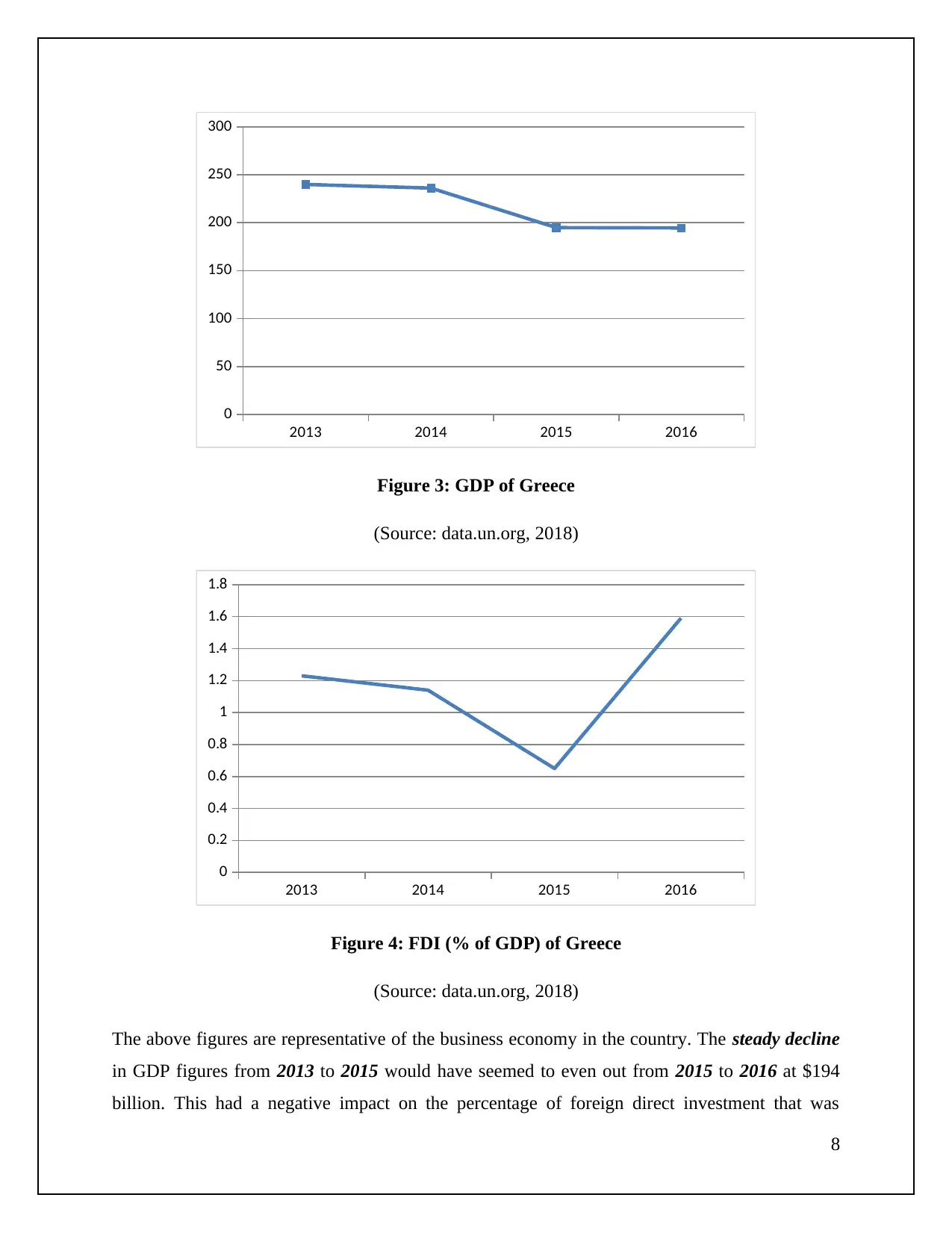
2013 2014 2015 2016
0
50
100
150
200
250
300
Figure 3: GDP of Greece
(Source: data.un.org, 2018)
2013 2014 2015 2016
0
0.2
0.4
0.6
0.8
1
1.2
1.4
1.6
1.8
Figure 4: FDI (% of GDP) of Greece
(Source: data.un.org, 2018)
The above figures are representative of the business economy in the country. The steady decline
in GDP figures from 2013 to 2015 would have seemed to even out from 2015 to 2016 at $194
billion. This had a negative impact on the percentage of foreign direct investment that was
8
0
50
100
150
200
250
300
Figure 3: GDP of Greece
(Source: data.un.org, 2018)
2013 2014 2015 2016
0
0.2
0.4
0.6
0.8
1
1.2
1.4
1.6
1.8
Figure 4: FDI (% of GDP) of Greece
(Source: data.un.org, 2018)
The above figures are representative of the business economy in the country. The steady decline
in GDP figures from 2013 to 2015 would have seemed to even out from 2015 to 2016 at $194
billion. This had a negative impact on the percentage of foreign direct investment that was
8
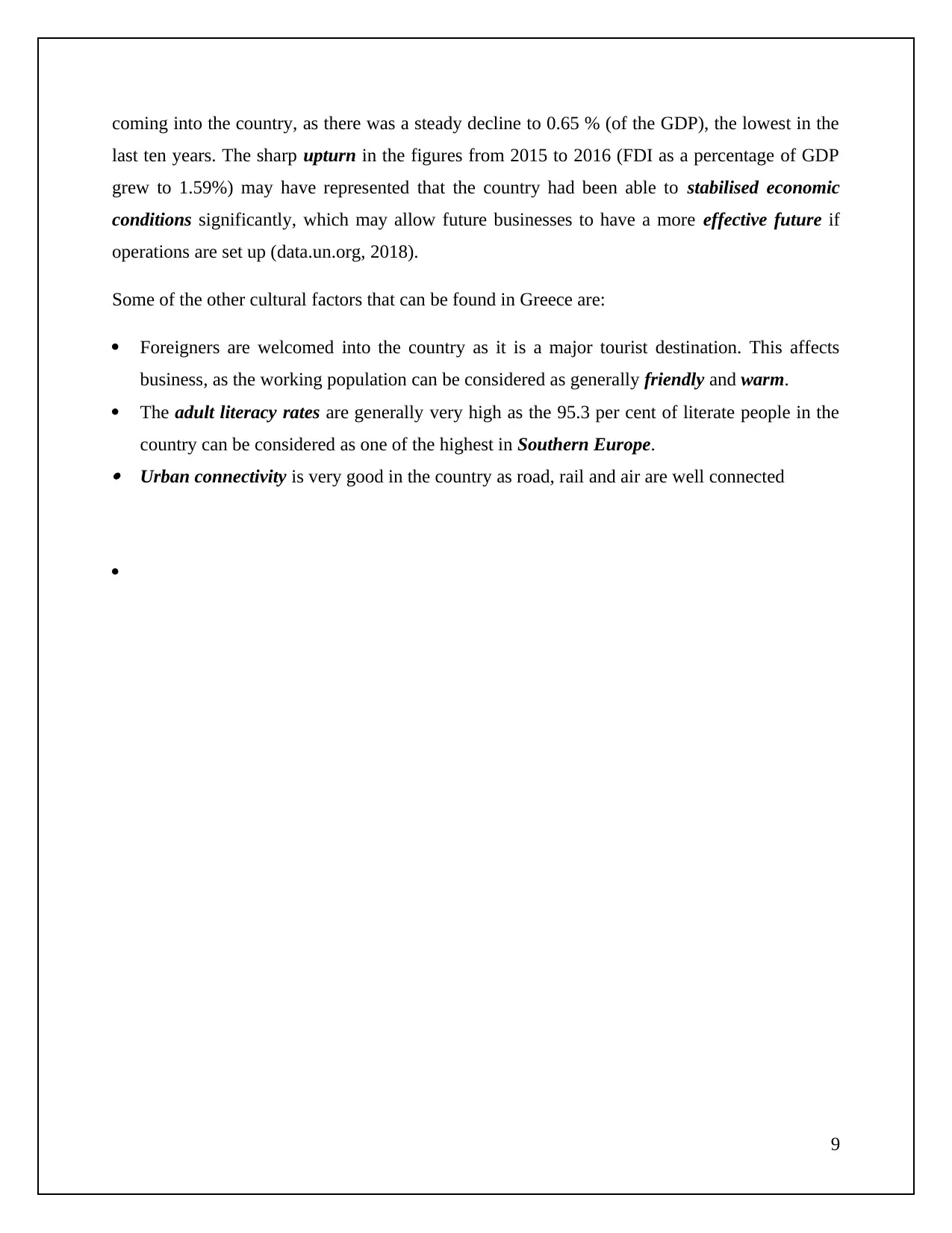
coming into the country, as there was a steady decline to 0.65 % (of the GDP), the lowest in the
last ten years. The sharp upturn in the figures from 2015 to 2016 (FDI as a percentage of GDP
grew to 1.59%) may have represented that the country had been able to stabilised economic
conditions significantly, which may allow future businesses to have a more effective future if
operations are set up (data.un.org, 2018).
Some of the other cultural factors that can be found in Greece are:
Foreigners are welcomed into the country as it is a major tourist destination. This affects
business, as the working population can be considered as generally friendly and warm.
The adult literacy rates are generally very high as the 95.3 per cent of literate people in the
country can be considered as one of the highest in Southern Europe. Urban connectivity is very good in the country as road, rail and air are well connected
9
last ten years. The sharp upturn in the figures from 2015 to 2016 (FDI as a percentage of GDP
grew to 1.59%) may have represented that the country had been able to stabilised economic
conditions significantly, which may allow future businesses to have a more effective future if
operations are set up (data.un.org, 2018).
Some of the other cultural factors that can be found in Greece are:
Foreigners are welcomed into the country as it is a major tourist destination. This affects
business, as the working population can be considered as generally friendly and warm.
The adult literacy rates are generally very high as the 95.3 per cent of literate people in the
country can be considered as one of the highest in Southern Europe. Urban connectivity is very good in the country as road, rail and air are well connected
9
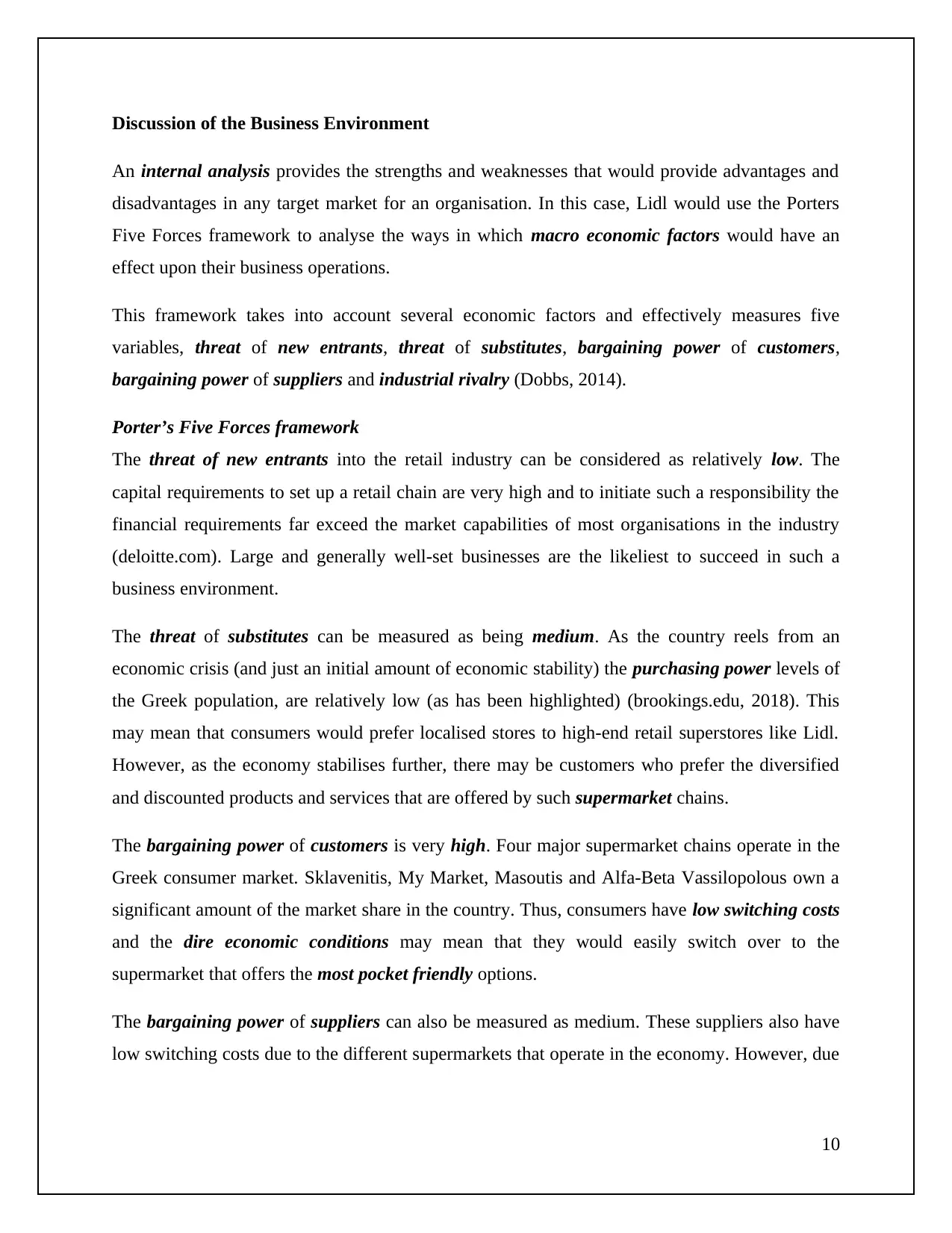
Discussion of the Business Environment
An internal analysis provides the strengths and weaknesses that would provide advantages and
disadvantages in any target market for an organisation. In this case, Lidl would use the Porters
Five Forces framework to analyse the ways in which macro economic factors would have an
effect upon their business operations.
This framework takes into account several economic factors and effectively measures five
variables, threat of new entrants, threat of substitutes, bargaining power of customers,
bargaining power of suppliers and industrial rivalry (Dobbs, 2014).
Porter’s Five Forces framework
The threat of new entrants into the retail industry can be considered as relatively low. The
capital requirements to set up a retail chain are very high and to initiate such a responsibility the
financial requirements far exceed the market capabilities of most organisations in the industry
(deloitte.com). Large and generally well-set businesses are the likeliest to succeed in such a
business environment.
The threat of substitutes can be measured as being medium. As the country reels from an
economic crisis (and just an initial amount of economic stability) the purchasing power levels of
the Greek population, are relatively low (as has been highlighted) (brookings.edu, 2018). This
may mean that consumers would prefer localised stores to high-end retail superstores like Lidl.
However, as the economy stabilises further, there may be customers who prefer the diversified
and discounted products and services that are offered by such supermarket chains.
The bargaining power of customers is very high. Four major supermarket chains operate in the
Greek consumer market. Sklavenitis, My Market, Masoutis and Alfa-Beta Vassilopolous own a
significant amount of the market share in the country. Thus, consumers have low switching costs
and the dire economic conditions may mean that they would easily switch over to the
supermarket that offers the most pocket friendly options.
The bargaining power of suppliers can also be measured as medium. These suppliers also have
low switching costs due to the different supermarkets that operate in the economy. However, due
10
An internal analysis provides the strengths and weaknesses that would provide advantages and
disadvantages in any target market for an organisation. In this case, Lidl would use the Porters
Five Forces framework to analyse the ways in which macro economic factors would have an
effect upon their business operations.
This framework takes into account several economic factors and effectively measures five
variables, threat of new entrants, threat of substitutes, bargaining power of customers,
bargaining power of suppliers and industrial rivalry (Dobbs, 2014).
Porter’s Five Forces framework
The threat of new entrants into the retail industry can be considered as relatively low. The
capital requirements to set up a retail chain are very high and to initiate such a responsibility the
financial requirements far exceed the market capabilities of most organisations in the industry
(deloitte.com). Large and generally well-set businesses are the likeliest to succeed in such a
business environment.
The threat of substitutes can be measured as being medium. As the country reels from an
economic crisis (and just an initial amount of economic stability) the purchasing power levels of
the Greek population, are relatively low (as has been highlighted) (brookings.edu, 2018). This
may mean that consumers would prefer localised stores to high-end retail superstores like Lidl.
However, as the economy stabilises further, there may be customers who prefer the diversified
and discounted products and services that are offered by such supermarket chains.
The bargaining power of customers is very high. Four major supermarket chains operate in the
Greek consumer market. Sklavenitis, My Market, Masoutis and Alfa-Beta Vassilopolous own a
significant amount of the market share in the country. Thus, consumers have low switching costs
and the dire economic conditions may mean that they would easily switch over to the
supermarket that offers the most pocket friendly options.
The bargaining power of suppliers can also be measured as medium. These suppliers also have
low switching costs due to the different supermarkets that operate in the economy. However, due
10
Secure Best Marks with AI Grader
Need help grading? Try our AI Grader for instant feedback on your assignments.
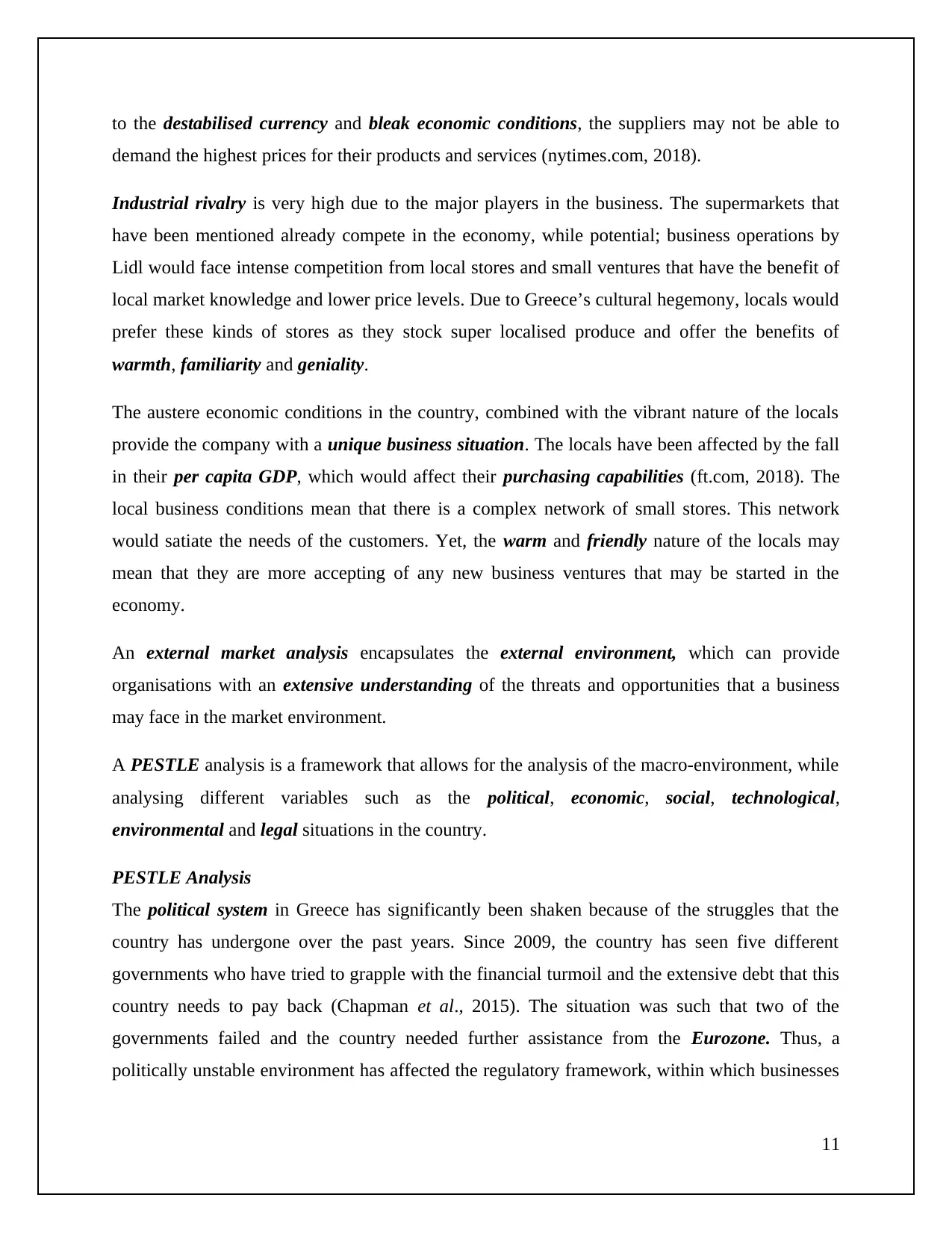
to the destabilised currency and bleak economic conditions, the suppliers may not be able to
demand the highest prices for their products and services (nytimes.com, 2018).
Industrial rivalry is very high due to the major players in the business. The supermarkets that
have been mentioned already compete in the economy, while potential; business operations by
Lidl would face intense competition from local stores and small ventures that have the benefit of
local market knowledge and lower price levels. Due to Greece’s cultural hegemony, locals would
prefer these kinds of stores as they stock super localised produce and offer the benefits of
warmth, familiarity and geniality.
The austere economic conditions in the country, combined with the vibrant nature of the locals
provide the company with a unique business situation. The locals have been affected by the fall
in their per capita GDP, which would affect their purchasing capabilities (ft.com, 2018). The
local business conditions mean that there is a complex network of small stores. This network
would satiate the needs of the customers. Yet, the warm and friendly nature of the locals may
mean that they are more accepting of any new business ventures that may be started in the
economy.
An external market analysis encapsulates the external environment, which can provide
organisations with an extensive understanding of the threats and opportunities that a business
may face in the market environment.
A PESTLE analysis is a framework that allows for the analysis of the macro-environment, while
analysing different variables such as the political, economic, social, technological,
environmental and legal situations in the country.
PESTLE Analysis
The political system in Greece has significantly been shaken because of the struggles that the
country has undergone over the past years. Since 2009, the country has seen five different
governments who have tried to grapple with the financial turmoil and the extensive debt that this
country needs to pay back (Chapman et al., 2015). The situation was such that two of the
governments failed and the country needed further assistance from the Eurozone. Thus, a
politically unstable environment has affected the regulatory framework, within which businesses
11
demand the highest prices for their products and services (nytimes.com, 2018).
Industrial rivalry is very high due to the major players in the business. The supermarkets that
have been mentioned already compete in the economy, while potential; business operations by
Lidl would face intense competition from local stores and small ventures that have the benefit of
local market knowledge and lower price levels. Due to Greece’s cultural hegemony, locals would
prefer these kinds of stores as they stock super localised produce and offer the benefits of
warmth, familiarity and geniality.
The austere economic conditions in the country, combined with the vibrant nature of the locals
provide the company with a unique business situation. The locals have been affected by the fall
in their per capita GDP, which would affect their purchasing capabilities (ft.com, 2018). The
local business conditions mean that there is a complex network of small stores. This network
would satiate the needs of the customers. Yet, the warm and friendly nature of the locals may
mean that they are more accepting of any new business ventures that may be started in the
economy.
An external market analysis encapsulates the external environment, which can provide
organisations with an extensive understanding of the threats and opportunities that a business
may face in the market environment.
A PESTLE analysis is a framework that allows for the analysis of the macro-environment, while
analysing different variables such as the political, economic, social, technological,
environmental and legal situations in the country.
PESTLE Analysis
The political system in Greece has significantly been shaken because of the struggles that the
country has undergone over the past years. Since 2009, the country has seen five different
governments who have tried to grapple with the financial turmoil and the extensive debt that this
country needs to pay back (Chapman et al., 2015). The situation was such that two of the
governments failed and the country needed further assistance from the Eurozone. Thus, a
politically unstable environment has affected the regulatory framework, within which businesses
11
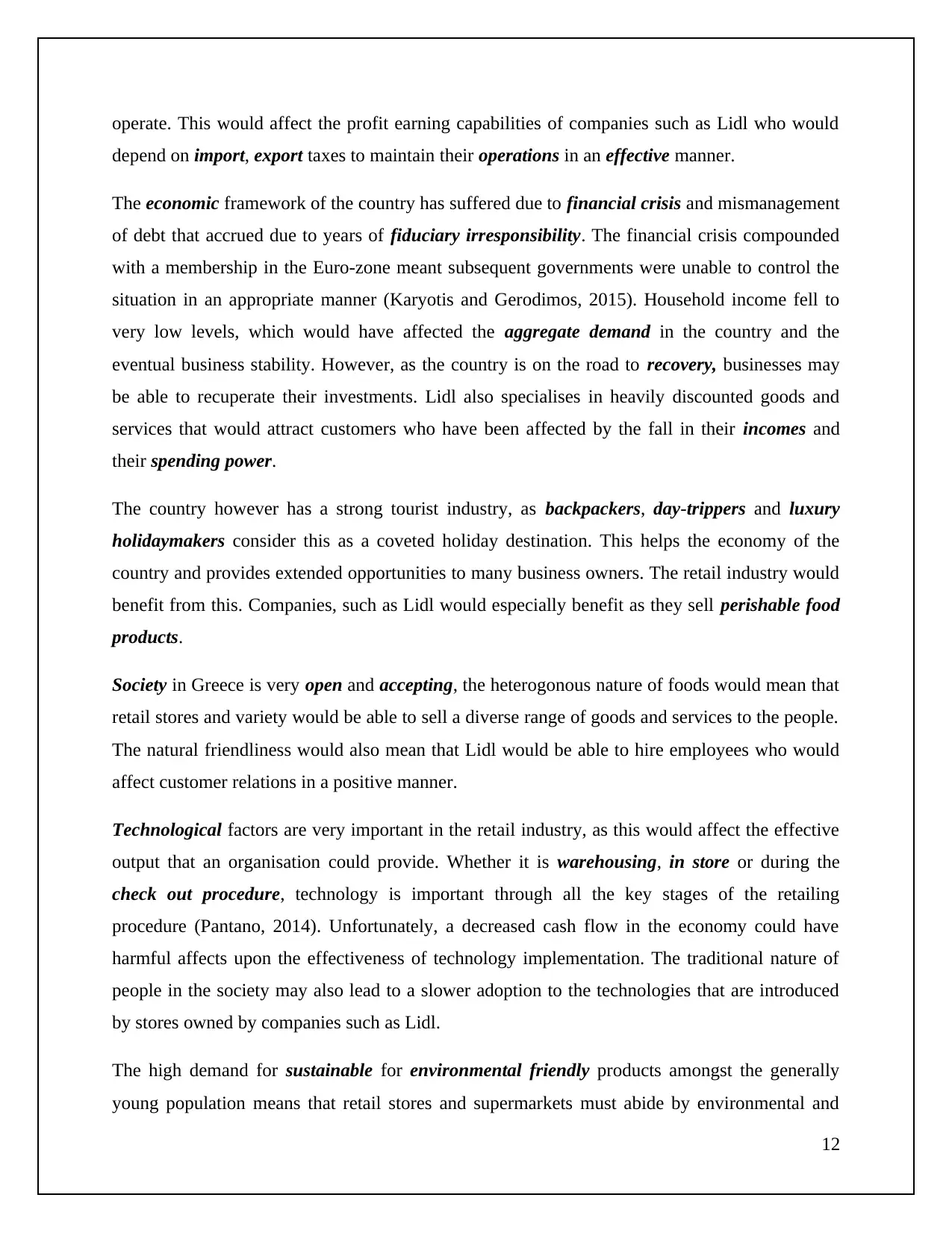
operate. This would affect the profit earning capabilities of companies such as Lidl who would
depend on import, export taxes to maintain their operations in an effective manner.
The economic framework of the country has suffered due to financial crisis and mismanagement
of debt that accrued due to years of fiduciary irresponsibility. The financial crisis compounded
with a membership in the Euro-zone meant subsequent governments were unable to control the
situation in an appropriate manner (Karyotis and Gerodimos, 2015). Household income fell to
very low levels, which would have affected the aggregate demand in the country and the
eventual business stability. However, as the country is on the road to recovery, businesses may
be able to recuperate their investments. Lidl also specialises in heavily discounted goods and
services that would attract customers who have been affected by the fall in their incomes and
their spending power.
The country however has a strong tourist industry, as backpackers, day-trippers and luxury
holidaymakers consider this as a coveted holiday destination. This helps the economy of the
country and provides extended opportunities to many business owners. The retail industry would
benefit from this. Companies, such as Lidl would especially benefit as they sell perishable food
products.
Society in Greece is very open and accepting, the heterogonous nature of foods would mean that
retail stores and variety would be able to sell a diverse range of goods and services to the people.
The natural friendliness would also mean that Lidl would be able to hire employees who would
affect customer relations in a positive manner.
Technological factors are very important in the retail industry, as this would affect the effective
output that an organisation could provide. Whether it is warehousing, in store or during the
check out procedure, technology is important through all the key stages of the retailing
procedure (Pantano, 2014). Unfortunately, a decreased cash flow in the economy could have
harmful affects upon the effectiveness of technology implementation. The traditional nature of
people in the society may also lead to a slower adoption to the technologies that are introduced
by stores owned by companies such as Lidl.
The high demand for sustainable for environmental friendly products amongst the generally
young population means that retail stores and supermarkets must abide by environmental and
12
depend on import, export taxes to maintain their operations in an effective manner.
The economic framework of the country has suffered due to financial crisis and mismanagement
of debt that accrued due to years of fiduciary irresponsibility. The financial crisis compounded
with a membership in the Euro-zone meant subsequent governments were unable to control the
situation in an appropriate manner (Karyotis and Gerodimos, 2015). Household income fell to
very low levels, which would have affected the aggregate demand in the country and the
eventual business stability. However, as the country is on the road to recovery, businesses may
be able to recuperate their investments. Lidl also specialises in heavily discounted goods and
services that would attract customers who have been affected by the fall in their incomes and
their spending power.
The country however has a strong tourist industry, as backpackers, day-trippers and luxury
holidaymakers consider this as a coveted holiday destination. This helps the economy of the
country and provides extended opportunities to many business owners. The retail industry would
benefit from this. Companies, such as Lidl would especially benefit as they sell perishable food
products.
Society in Greece is very open and accepting, the heterogonous nature of foods would mean that
retail stores and variety would be able to sell a diverse range of goods and services to the people.
The natural friendliness would also mean that Lidl would be able to hire employees who would
affect customer relations in a positive manner.
Technological factors are very important in the retail industry, as this would affect the effective
output that an organisation could provide. Whether it is warehousing, in store or during the
check out procedure, technology is important through all the key stages of the retailing
procedure (Pantano, 2014). Unfortunately, a decreased cash flow in the economy could have
harmful affects upon the effectiveness of technology implementation. The traditional nature of
people in the society may also lead to a slower adoption to the technologies that are introduced
by stores owned by companies such as Lidl.
The high demand for sustainable for environmental friendly products amongst the generally
young population means that retail stores and supermarkets must abide by environmental and
12
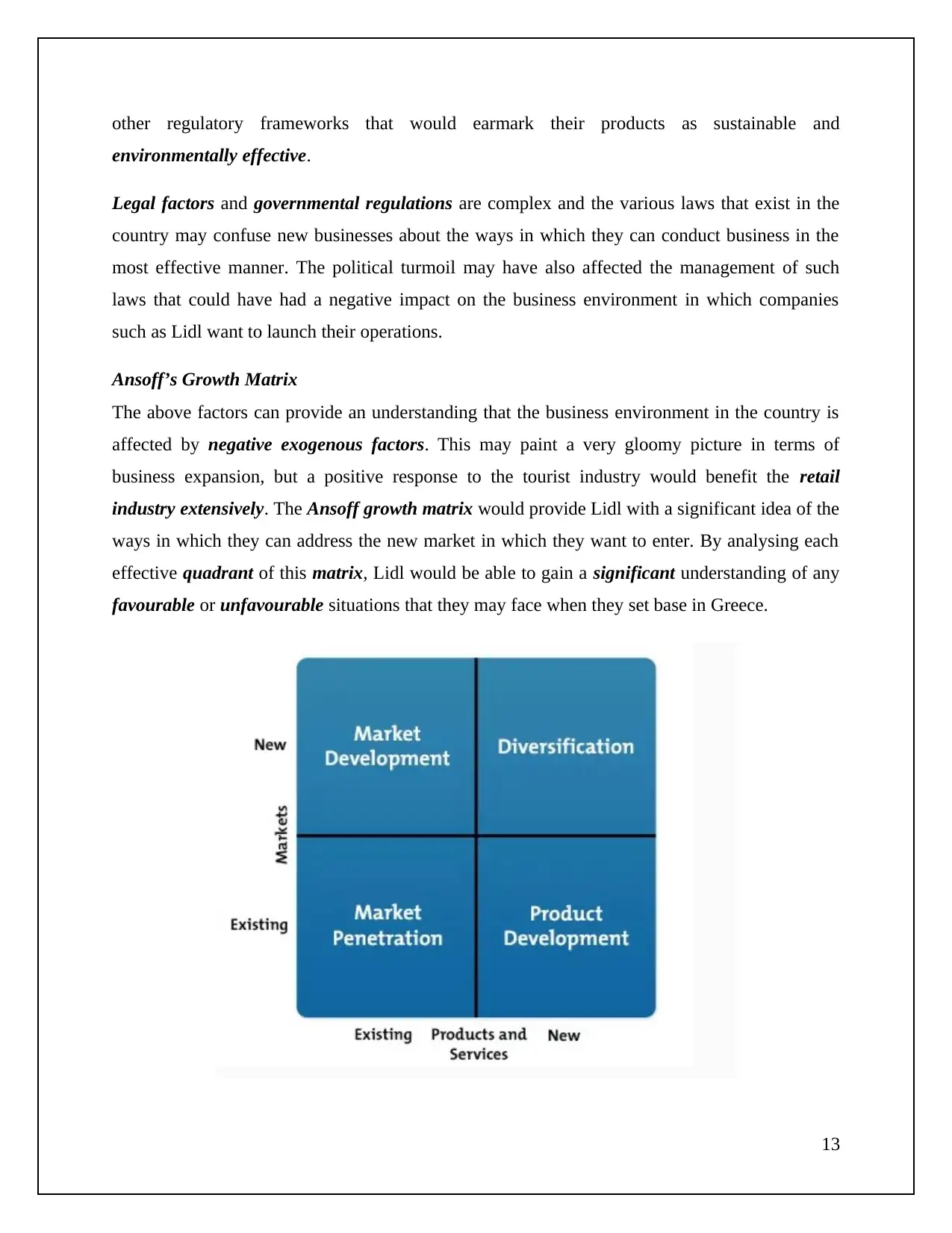
other regulatory frameworks that would earmark their products as sustainable and
environmentally effective.
Legal factors and governmental regulations are complex and the various laws that exist in the
country may confuse new businesses about the ways in which they can conduct business in the
most effective manner. The political turmoil may have also affected the management of such
laws that could have had a negative impact on the business environment in which companies
such as Lidl want to launch their operations.
Ansoff’s Growth Matrix
The above factors can provide an understanding that the business environment in the country is
affected by negative exogenous factors. This may paint a very gloomy picture in terms of
business expansion, but a positive response to the tourist industry would benefit the retail
industry extensively. The Ansoff growth matrix would provide Lidl with a significant idea of the
ways in which they can address the new market in which they want to enter. By analysing each
effective quadrant of this matrix, Lidl would be able to gain a significant understanding of any
favourable or unfavourable situations that they may face when they set base in Greece.
13
environmentally effective.
Legal factors and governmental regulations are complex and the various laws that exist in the
country may confuse new businesses about the ways in which they can conduct business in the
most effective manner. The political turmoil may have also affected the management of such
laws that could have had a negative impact on the business environment in which companies
such as Lidl want to launch their operations.
Ansoff’s Growth Matrix
The above factors can provide an understanding that the business environment in the country is
affected by negative exogenous factors. This may paint a very gloomy picture in terms of
business expansion, but a positive response to the tourist industry would benefit the retail
industry extensively. The Ansoff growth matrix would provide Lidl with a significant idea of the
ways in which they can address the new market in which they want to enter. By analysing each
effective quadrant of this matrix, Lidl would be able to gain a significant understanding of any
favourable or unfavourable situations that they may face when they set base in Greece.
13
Paraphrase This Document
Need a fresh take? Get an instant paraphrase of this document with our AI Paraphraser
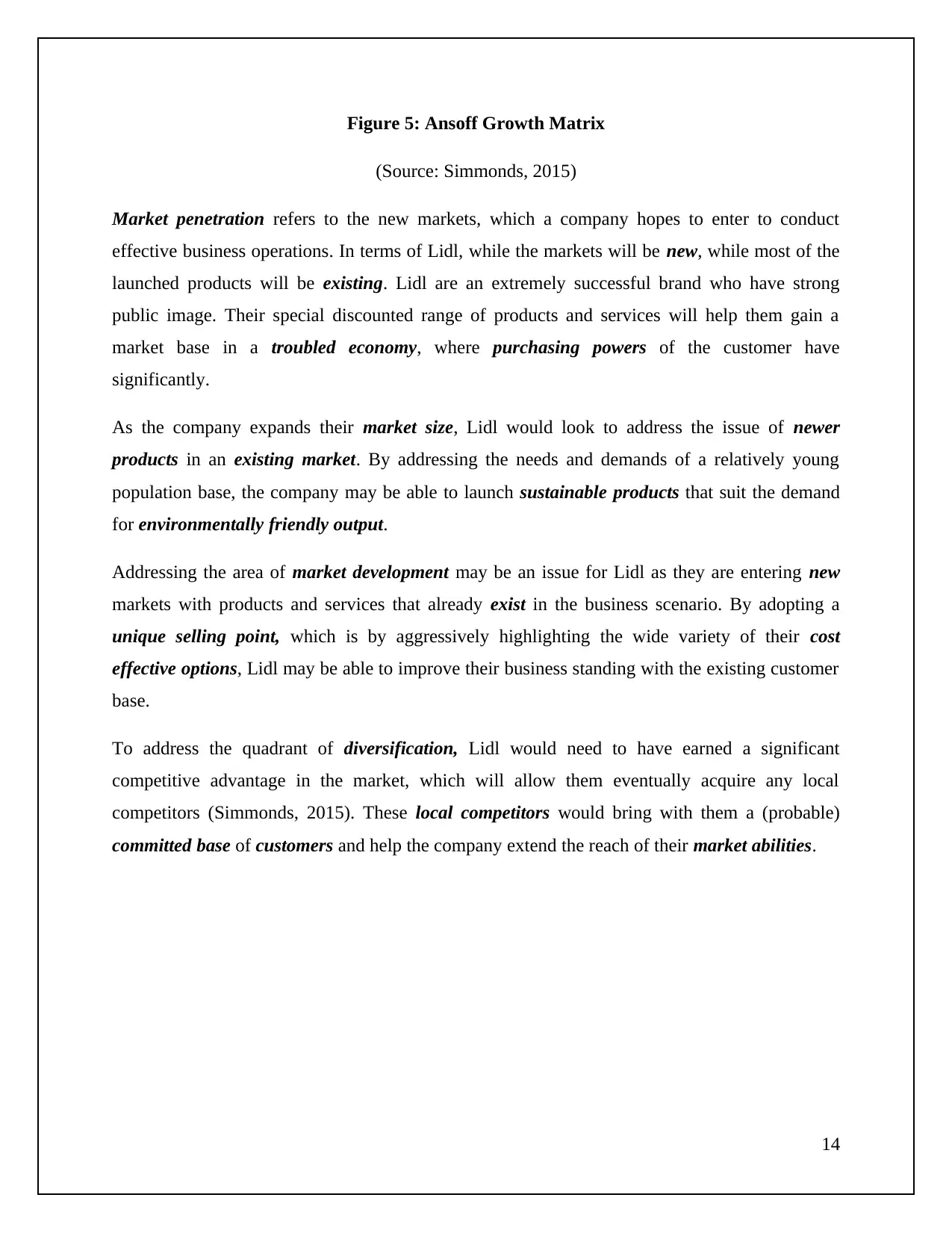
Figure 5: Ansoff Growth Matrix
(Source: Simmonds, 2015)
Market penetration refers to the new markets, which a company hopes to enter to conduct
effective business operations. In terms of Lidl, while the markets will be new, while most of the
launched products will be existing. Lidl are an extremely successful brand who have strong
public image. Their special discounted range of products and services will help them gain a
market base in a troubled economy, where purchasing powers of the customer have
significantly.
As the company expands their market size, Lidl would look to address the issue of newer
products in an existing market. By addressing the needs and demands of a relatively young
population base, the company may be able to launch sustainable products that suit the demand
for environmentally friendly output.
Addressing the area of market development may be an issue for Lidl as they are entering new
markets with products and services that already exist in the business scenario. By adopting a
unique selling point, which is by aggressively highlighting the wide variety of their cost
effective options, Lidl may be able to improve their business standing with the existing customer
base.
To address the quadrant of diversification, Lidl would need to have earned a significant
competitive advantage in the market, which will allow them eventually acquire any local
competitors (Simmonds, 2015). These local competitors would bring with them a (probable)
committed base of customers and help the company extend the reach of their market abilities.
14
(Source: Simmonds, 2015)
Market penetration refers to the new markets, which a company hopes to enter to conduct
effective business operations. In terms of Lidl, while the markets will be new, while most of the
launched products will be existing. Lidl are an extremely successful brand who have strong
public image. Their special discounted range of products and services will help them gain a
market base in a troubled economy, where purchasing powers of the customer have
significantly.
As the company expands their market size, Lidl would look to address the issue of newer
products in an existing market. By addressing the needs and demands of a relatively young
population base, the company may be able to launch sustainable products that suit the demand
for environmentally friendly output.
Addressing the area of market development may be an issue for Lidl as they are entering new
markets with products and services that already exist in the business scenario. By adopting a
unique selling point, which is by aggressively highlighting the wide variety of their cost
effective options, Lidl may be able to improve their business standing with the existing customer
base.
To address the quadrant of diversification, Lidl would need to have earned a significant
competitive advantage in the market, which will allow them eventually acquire any local
competitors (Simmonds, 2015). These local competitors would bring with them a (probable)
committed base of customers and help the company extend the reach of their market abilities.
14
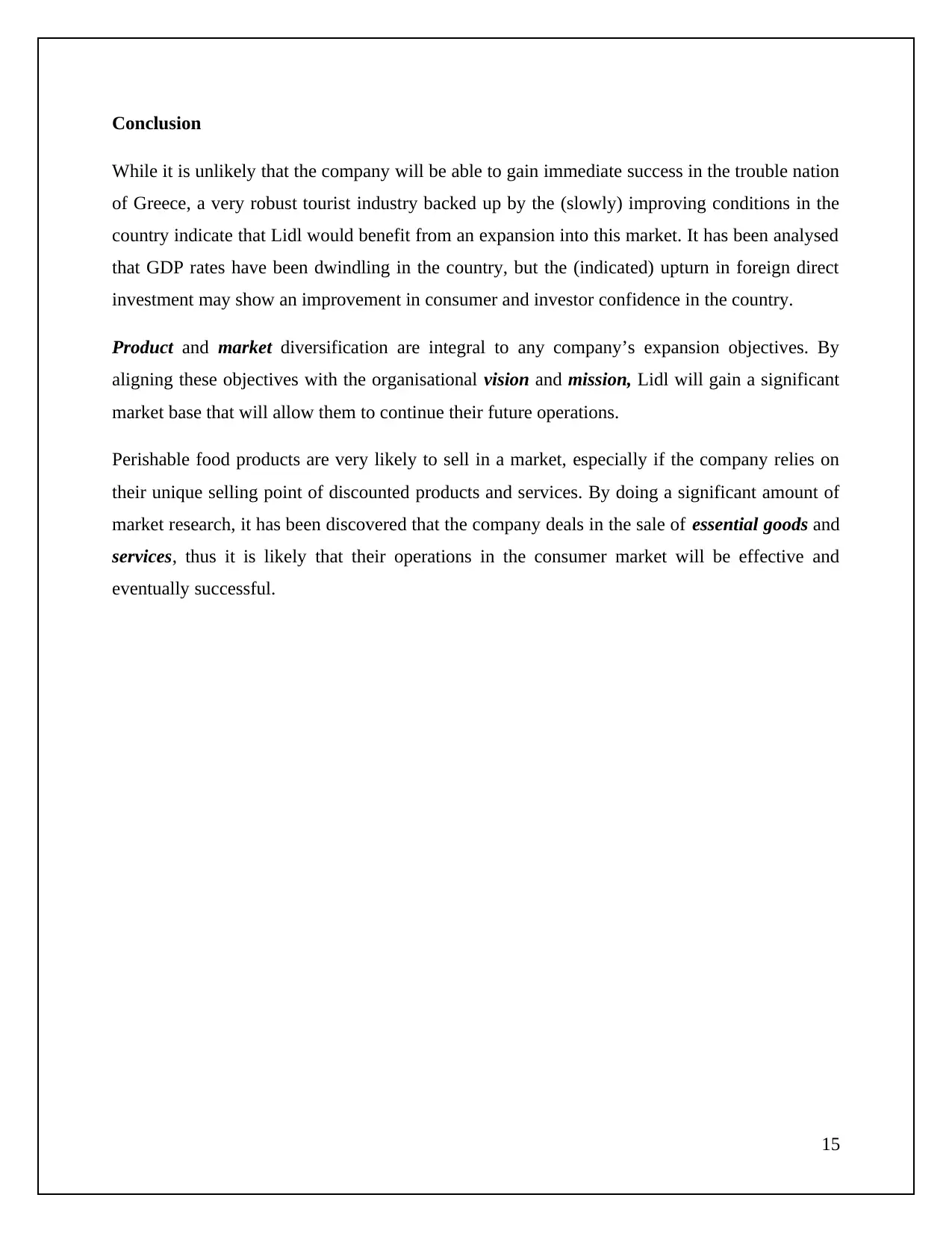
Conclusion
While it is unlikely that the company will be able to gain immediate success in the trouble nation
of Greece, a very robust tourist industry backed up by the (slowly) improving conditions in the
country indicate that Lidl would benefit from an expansion into this market. It has been analysed
that GDP rates have been dwindling in the country, but the (indicated) upturn in foreign direct
investment may show an improvement in consumer and investor confidence in the country.
Product and market diversification are integral to any company’s expansion objectives. By
aligning these objectives with the organisational vision and mission, Lidl will gain a significant
market base that will allow them to continue their future operations.
Perishable food products are very likely to sell in a market, especially if the company relies on
their unique selling point of discounted products and services. By doing a significant amount of
market research, it has been discovered that the company deals in the sale of essential goods and
services, thus it is likely that their operations in the consumer market will be effective and
eventually successful.
15
While it is unlikely that the company will be able to gain immediate success in the trouble nation
of Greece, a very robust tourist industry backed up by the (slowly) improving conditions in the
country indicate that Lidl would benefit from an expansion into this market. It has been analysed
that GDP rates have been dwindling in the country, but the (indicated) upturn in foreign direct
investment may show an improvement in consumer and investor confidence in the country.
Product and market diversification are integral to any company’s expansion objectives. By
aligning these objectives with the organisational vision and mission, Lidl will gain a significant
market base that will allow them to continue their future operations.
Perishable food products are very likely to sell in a market, especially if the company relies on
their unique selling point of discounted products and services. By doing a significant amount of
market research, it has been discovered that the company deals in the sale of essential goods and
services, thus it is likely that their operations in the consumer market will be effective and
eventually successful.
15
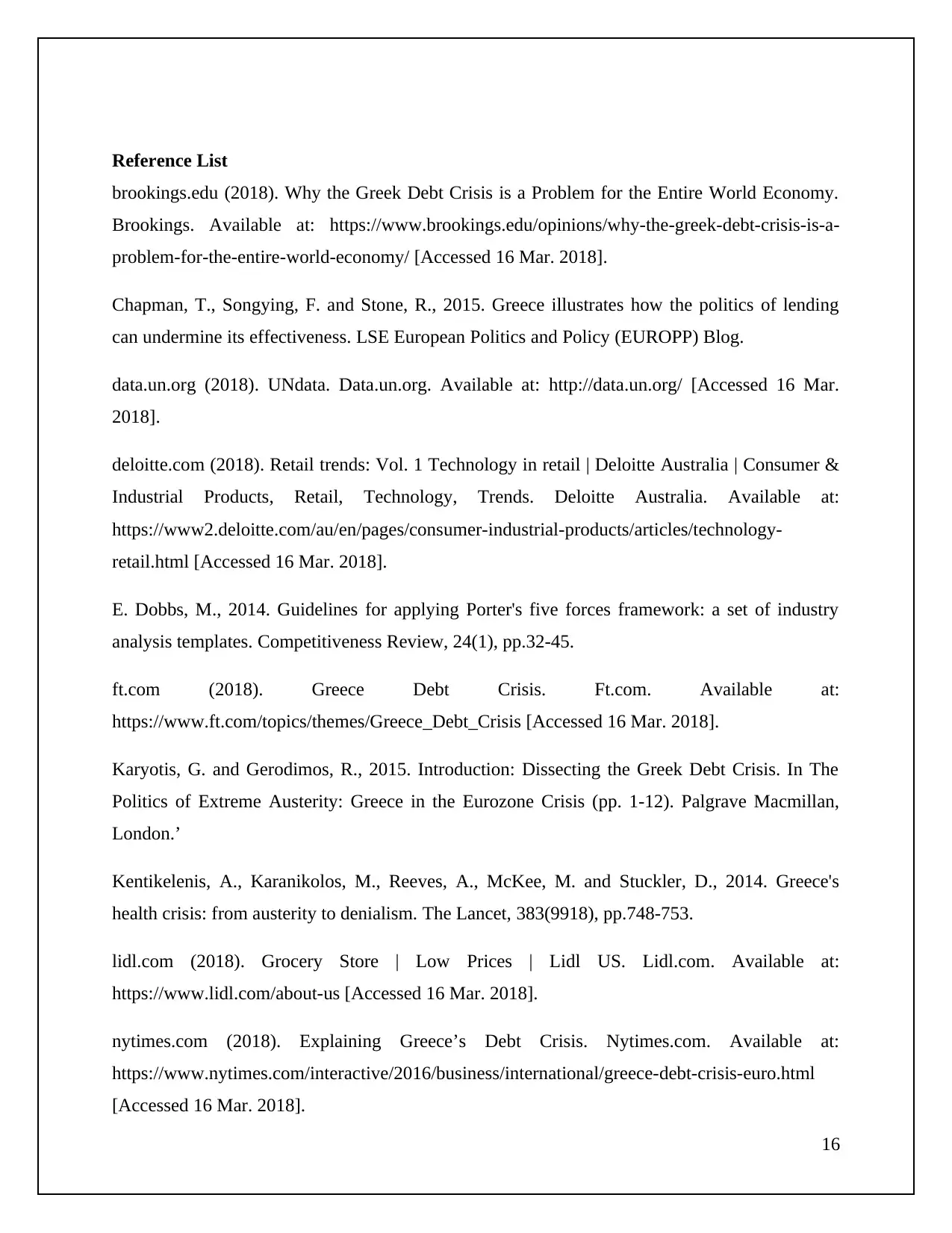
Reference List
brookings.edu (2018). Why the Greek Debt Crisis is a Problem for the Entire World Economy.
Brookings. Available at: https://www.brookings.edu/opinions/why-the-greek-debt-crisis-is-a-
problem-for-the-entire-world-economy/ [Accessed 16 Mar. 2018].
Chapman, T., Songying, F. and Stone, R., 2015. Greece illustrates how the politics of lending
can undermine its effectiveness. LSE European Politics and Policy (EUROPP) Blog.
data.un.org (2018). UNdata. Data.un.org. Available at: http://data.un.org/ [Accessed 16 Mar.
2018].
deloitte.com (2018). Retail trends: Vol. 1 Technology in retail | Deloitte Australia | Consumer &
Industrial Products, Retail, Technology, Trends. Deloitte Australia. Available at:
https://www2.deloitte.com/au/en/pages/consumer-industrial-products/articles/technology-
retail.html [Accessed 16 Mar. 2018].
E. Dobbs, M., 2014. Guidelines for applying Porter's five forces framework: a set of industry
analysis templates. Competitiveness Review, 24(1), pp.32-45.
ft.com (2018). Greece Debt Crisis. Ft.com. Available at:
https://www.ft.com/topics/themes/Greece_Debt_Crisis [Accessed 16 Mar. 2018].
Karyotis, G. and Gerodimos, R., 2015. Introduction: Dissecting the Greek Debt Crisis. In The
Politics of Extreme Austerity: Greece in the Eurozone Crisis (pp. 1-12). Palgrave Macmillan,
London.’
Kentikelenis, A., Karanikolos, M., Reeves, A., McKee, M. and Stuckler, D., 2014. Greece's
health crisis: from austerity to denialism. The Lancet, 383(9918), pp.748-753.
lidl.com (2018). Grocery Store | Low Prices | Lidl US. Lidl.com. Available at:
https://www.lidl.com/about-us [Accessed 16 Mar. 2018].
nytimes.com (2018). Explaining Greece’s Debt Crisis. Nytimes.com. Available at:
https://www.nytimes.com/interactive/2016/business/international/greece-debt-crisis-euro.html
[Accessed 16 Mar. 2018].
16
brookings.edu (2018). Why the Greek Debt Crisis is a Problem for the Entire World Economy.
Brookings. Available at: https://www.brookings.edu/opinions/why-the-greek-debt-crisis-is-a-
problem-for-the-entire-world-economy/ [Accessed 16 Mar. 2018].
Chapman, T., Songying, F. and Stone, R., 2015. Greece illustrates how the politics of lending
can undermine its effectiveness. LSE European Politics and Policy (EUROPP) Blog.
data.un.org (2018). UNdata. Data.un.org. Available at: http://data.un.org/ [Accessed 16 Mar.
2018].
deloitte.com (2018). Retail trends: Vol. 1 Technology in retail | Deloitte Australia | Consumer &
Industrial Products, Retail, Technology, Trends. Deloitte Australia. Available at:
https://www2.deloitte.com/au/en/pages/consumer-industrial-products/articles/technology-
retail.html [Accessed 16 Mar. 2018].
E. Dobbs, M., 2014. Guidelines for applying Porter's five forces framework: a set of industry
analysis templates. Competitiveness Review, 24(1), pp.32-45.
ft.com (2018). Greece Debt Crisis. Ft.com. Available at:
https://www.ft.com/topics/themes/Greece_Debt_Crisis [Accessed 16 Mar. 2018].
Karyotis, G. and Gerodimos, R., 2015. Introduction: Dissecting the Greek Debt Crisis. In The
Politics of Extreme Austerity: Greece in the Eurozone Crisis (pp. 1-12). Palgrave Macmillan,
London.’
Kentikelenis, A., Karanikolos, M., Reeves, A., McKee, M. and Stuckler, D., 2014. Greece's
health crisis: from austerity to denialism. The Lancet, 383(9918), pp.748-753.
lidl.com (2018). Grocery Store | Low Prices | Lidl US. Lidl.com. Available at:
https://www.lidl.com/about-us [Accessed 16 Mar. 2018].
nytimes.com (2018). Explaining Greece’s Debt Crisis. Nytimes.com. Available at:
https://www.nytimes.com/interactive/2016/business/international/greece-debt-crisis-euro.html
[Accessed 16 Mar. 2018].
16
Secure Best Marks with AI Grader
Need help grading? Try our AI Grader for instant feedback on your assignments.
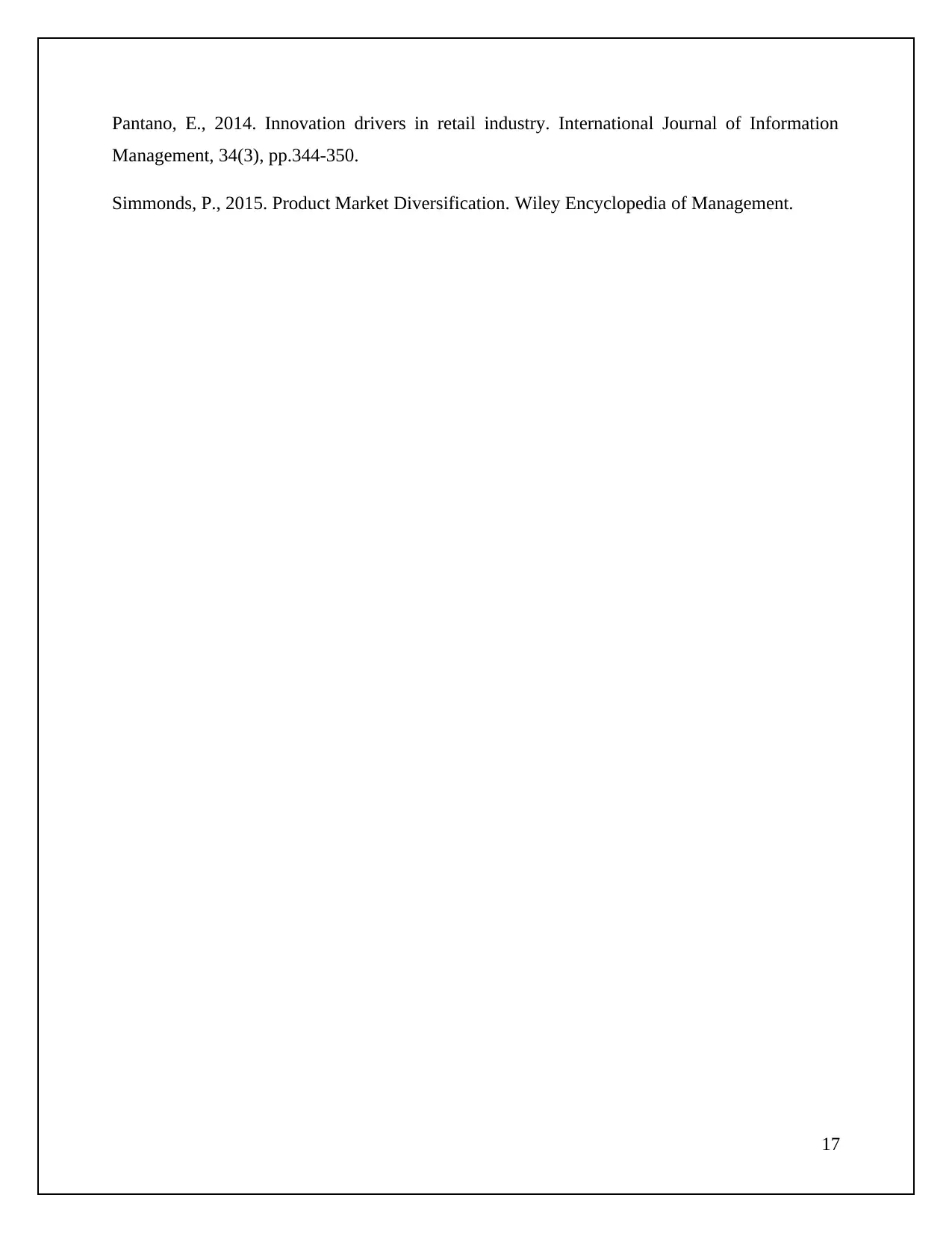
Pantano, E., 2014. Innovation drivers in retail industry. International Journal of Information
Management, 34(3), pp.344-350.
Simmonds, P., 2015. Product Market Diversification. Wiley Encyclopedia of Management.
17
Management, 34(3), pp.344-350.
Simmonds, P., 2015. Product Market Diversification. Wiley Encyclopedia of Management.
17
1 out of 17
Related Documents
Your All-in-One AI-Powered Toolkit for Academic Success.
+13062052269
info@desklib.com
Available 24*7 on WhatsApp / Email
![[object Object]](/_next/static/media/star-bottom.7253800d.svg)
Unlock your academic potential
© 2024 | Zucol Services PVT LTD | All rights reserved.





